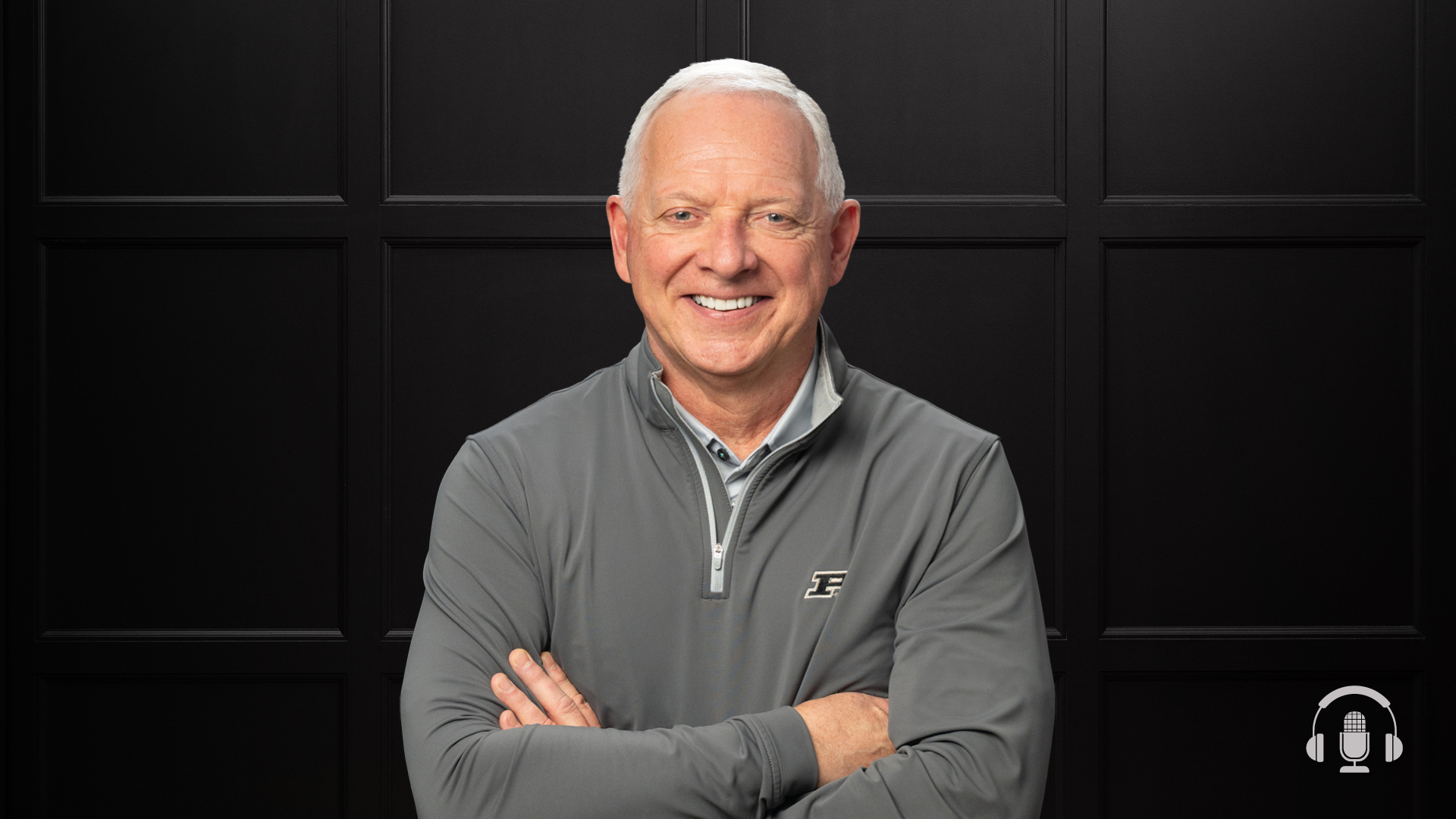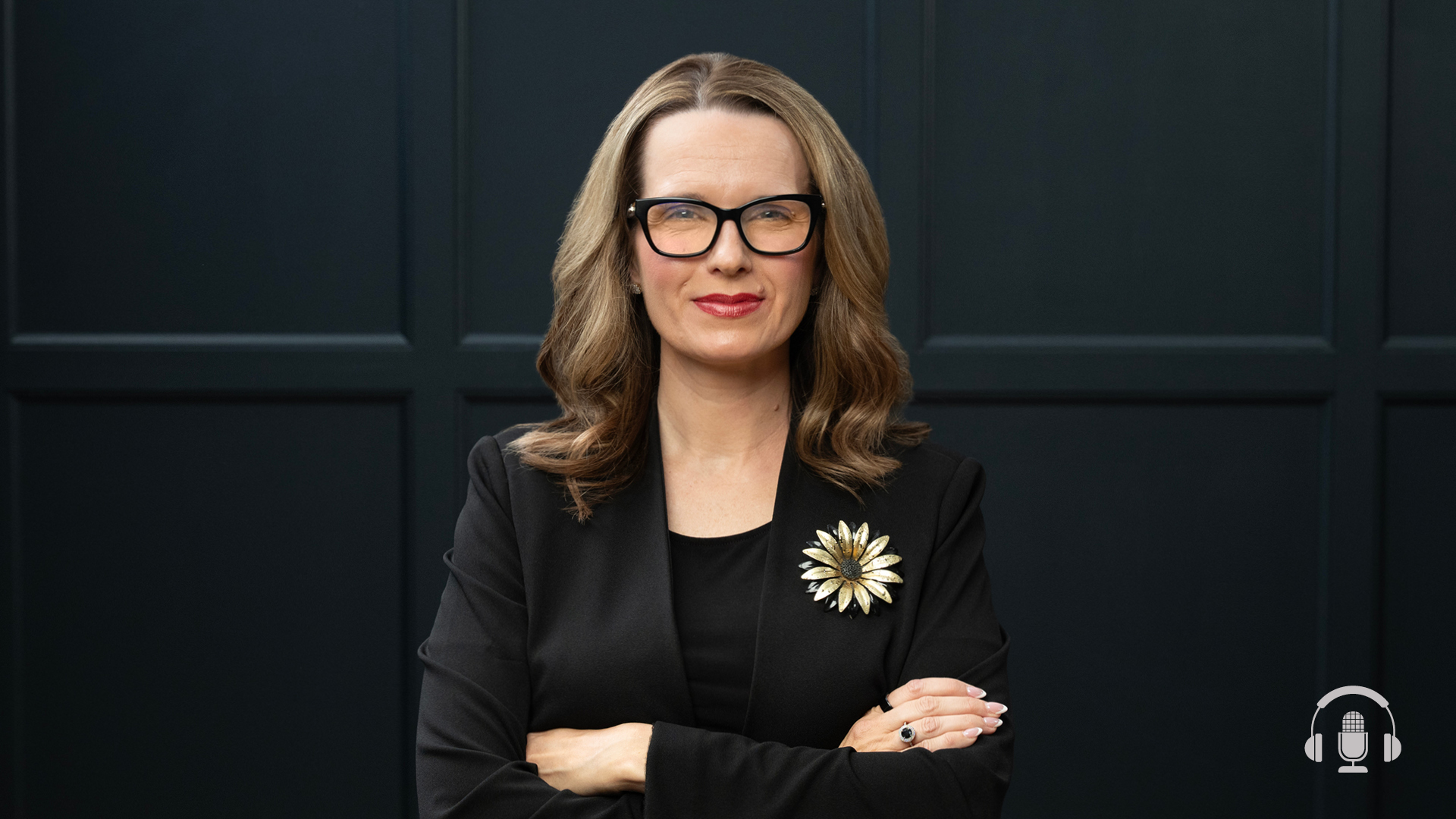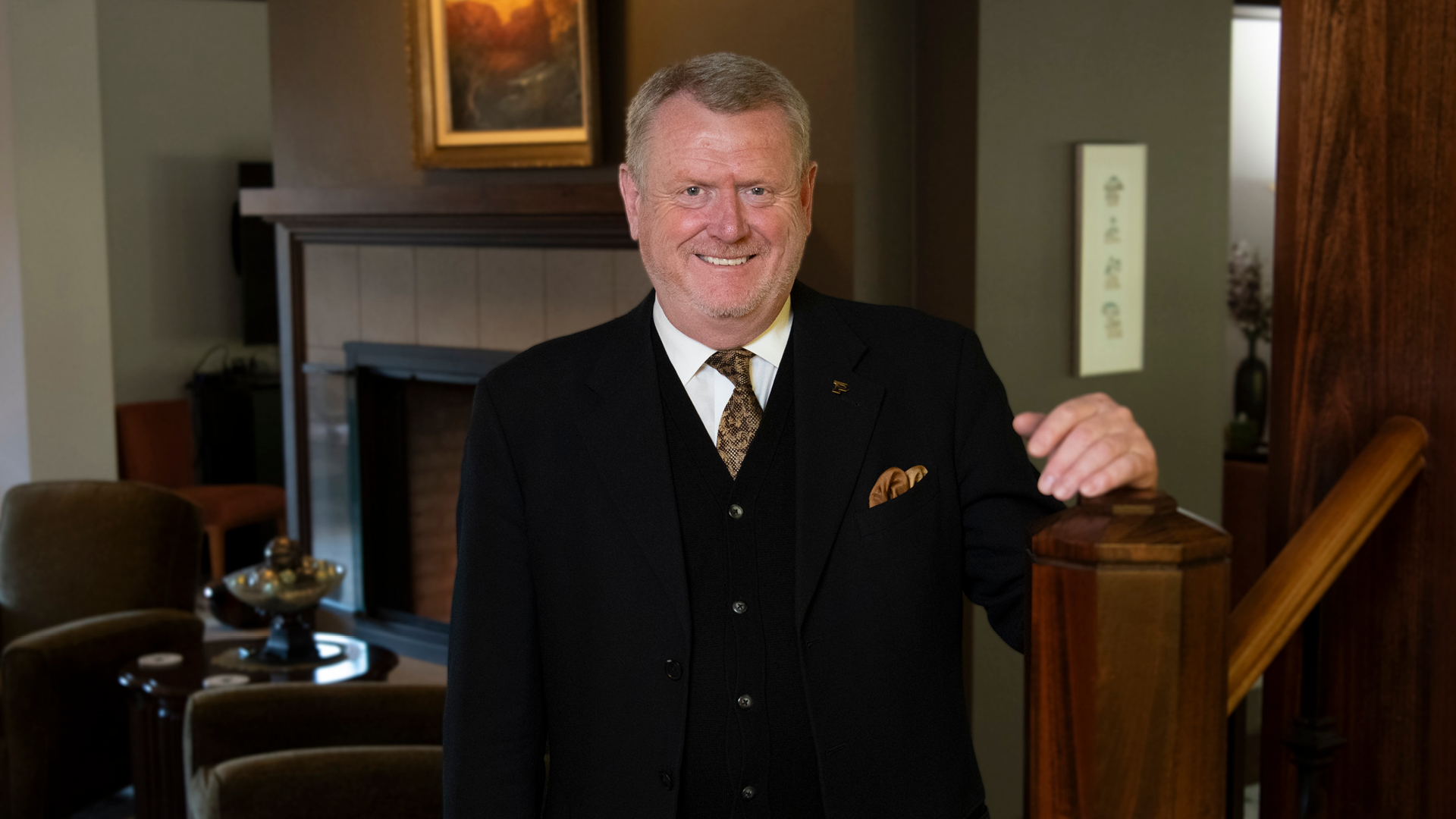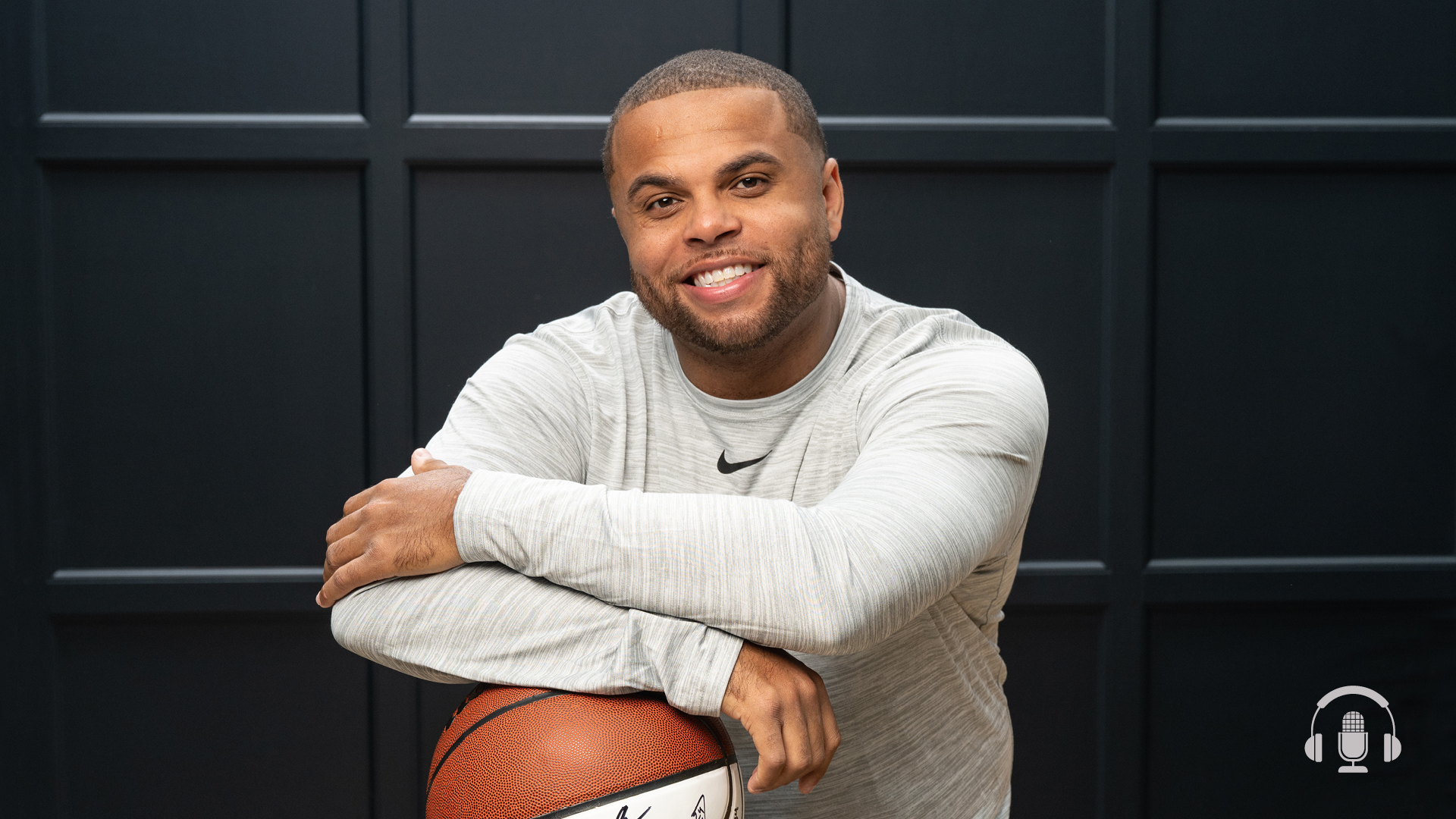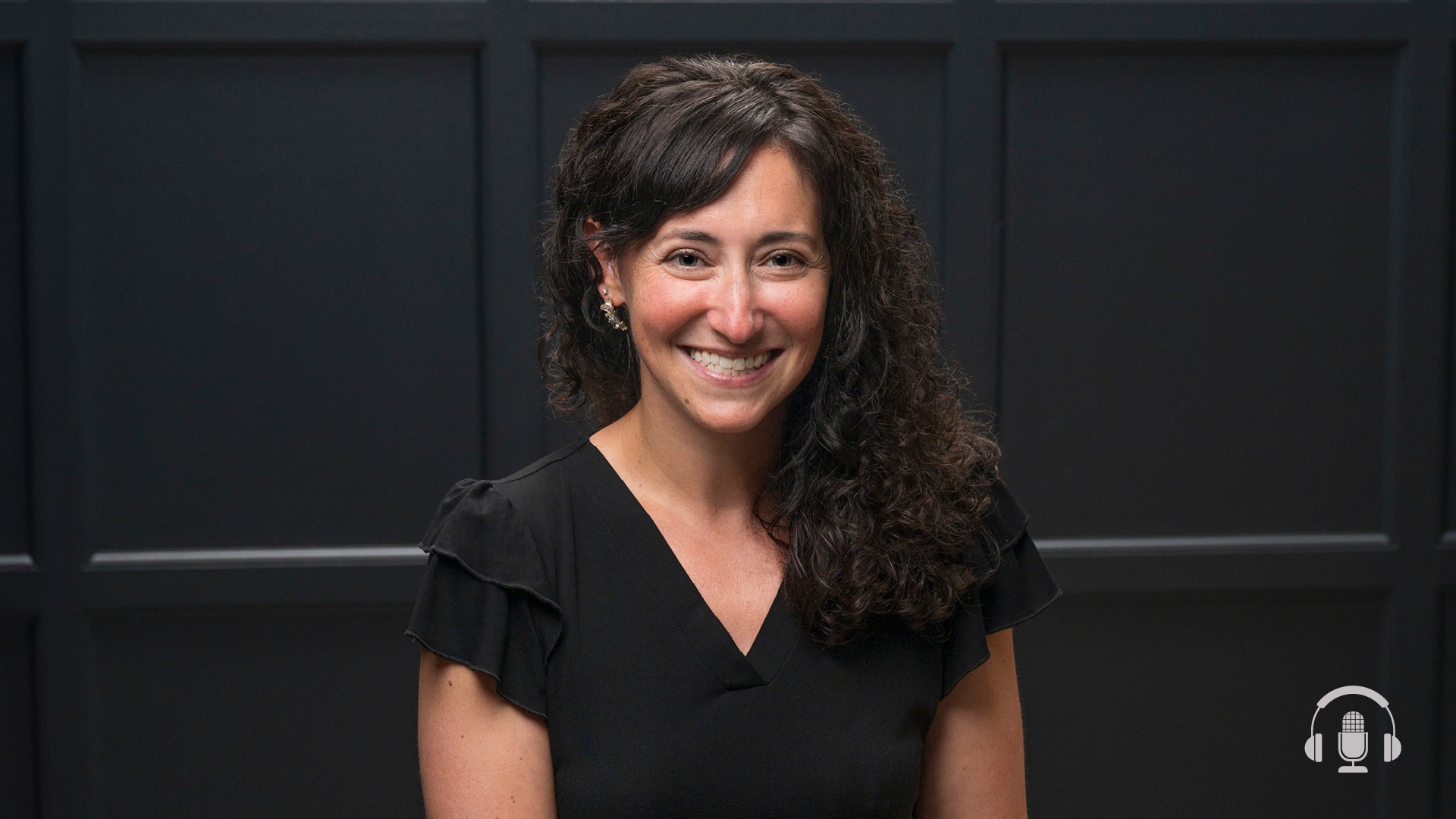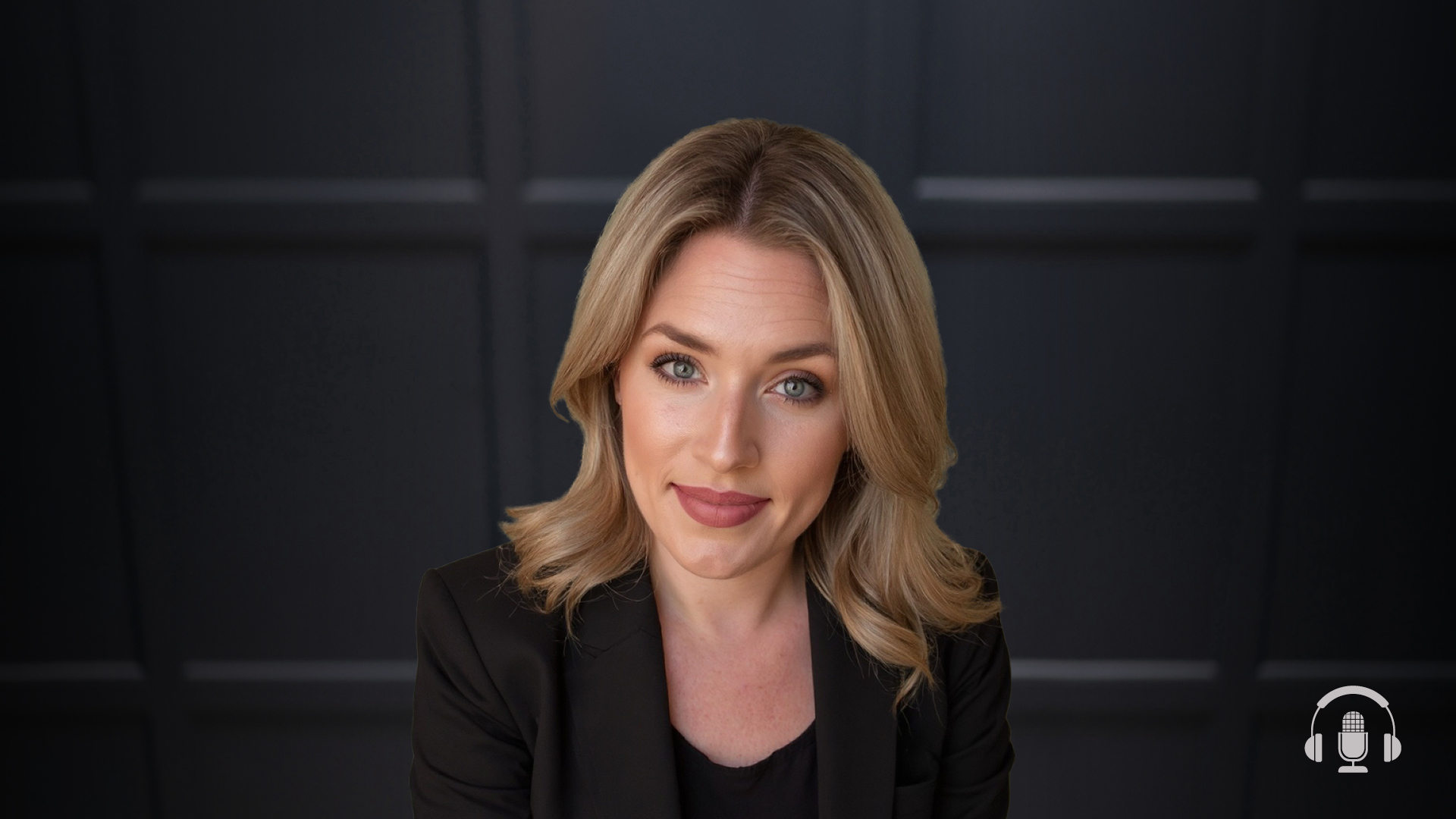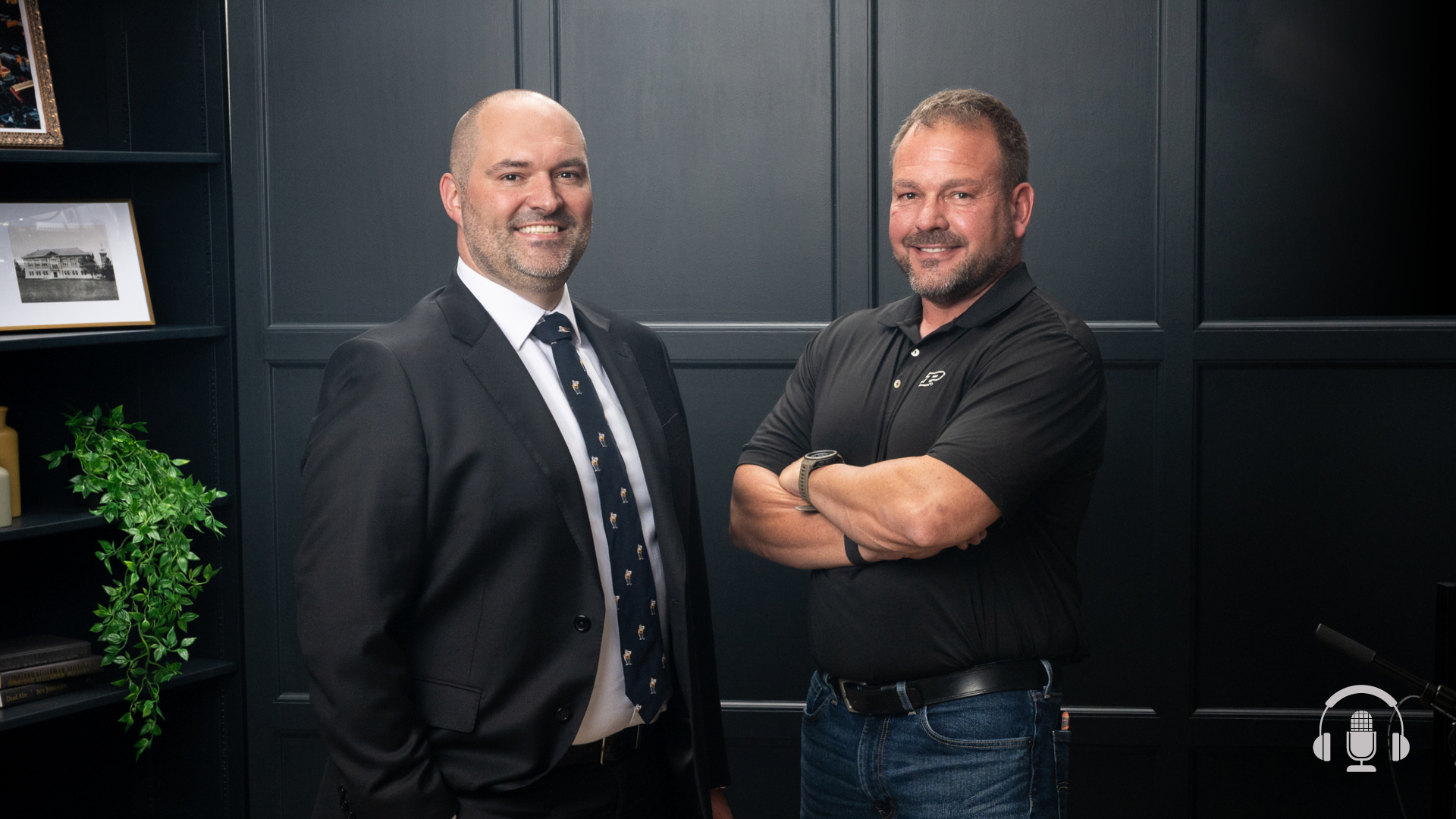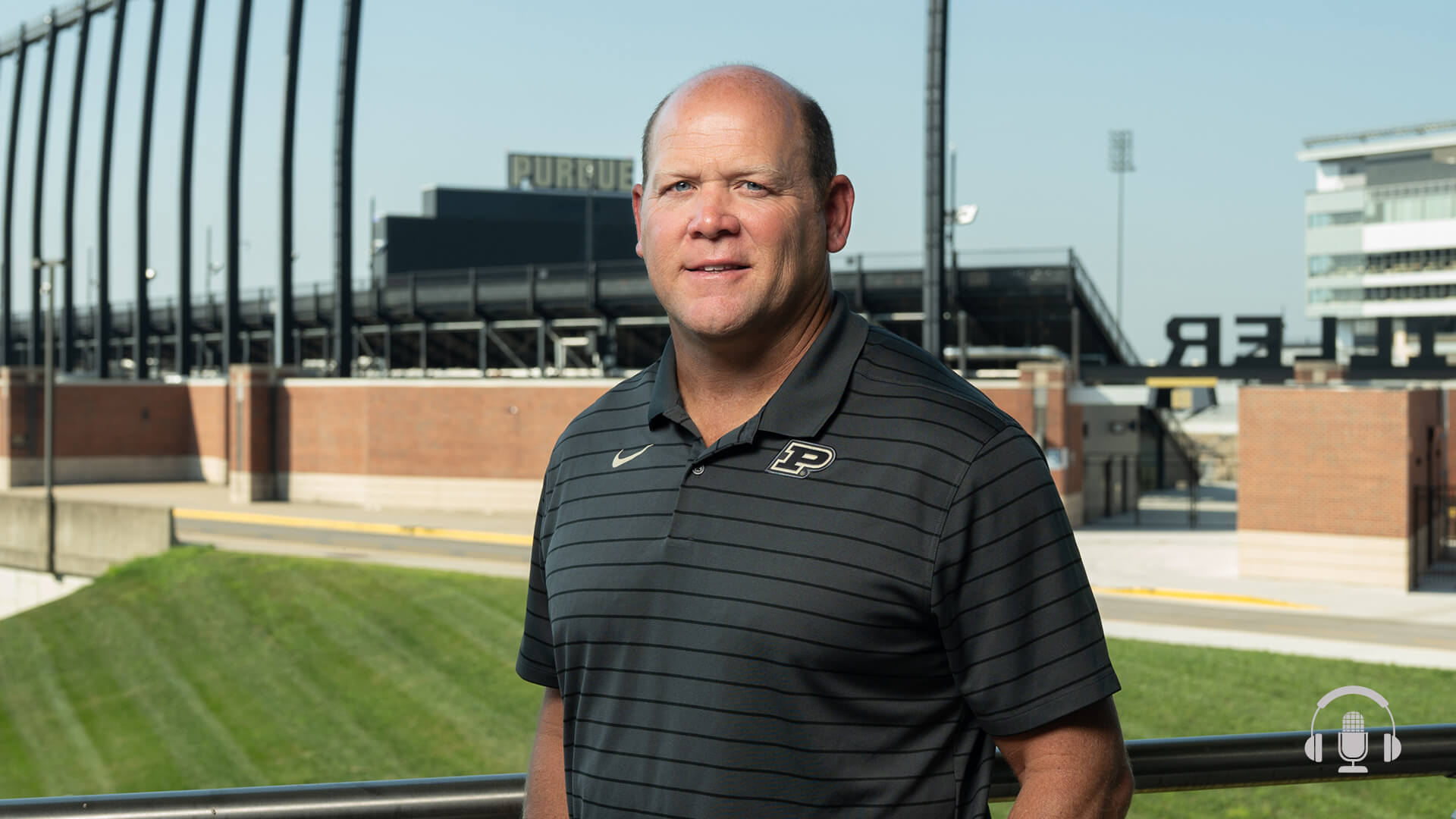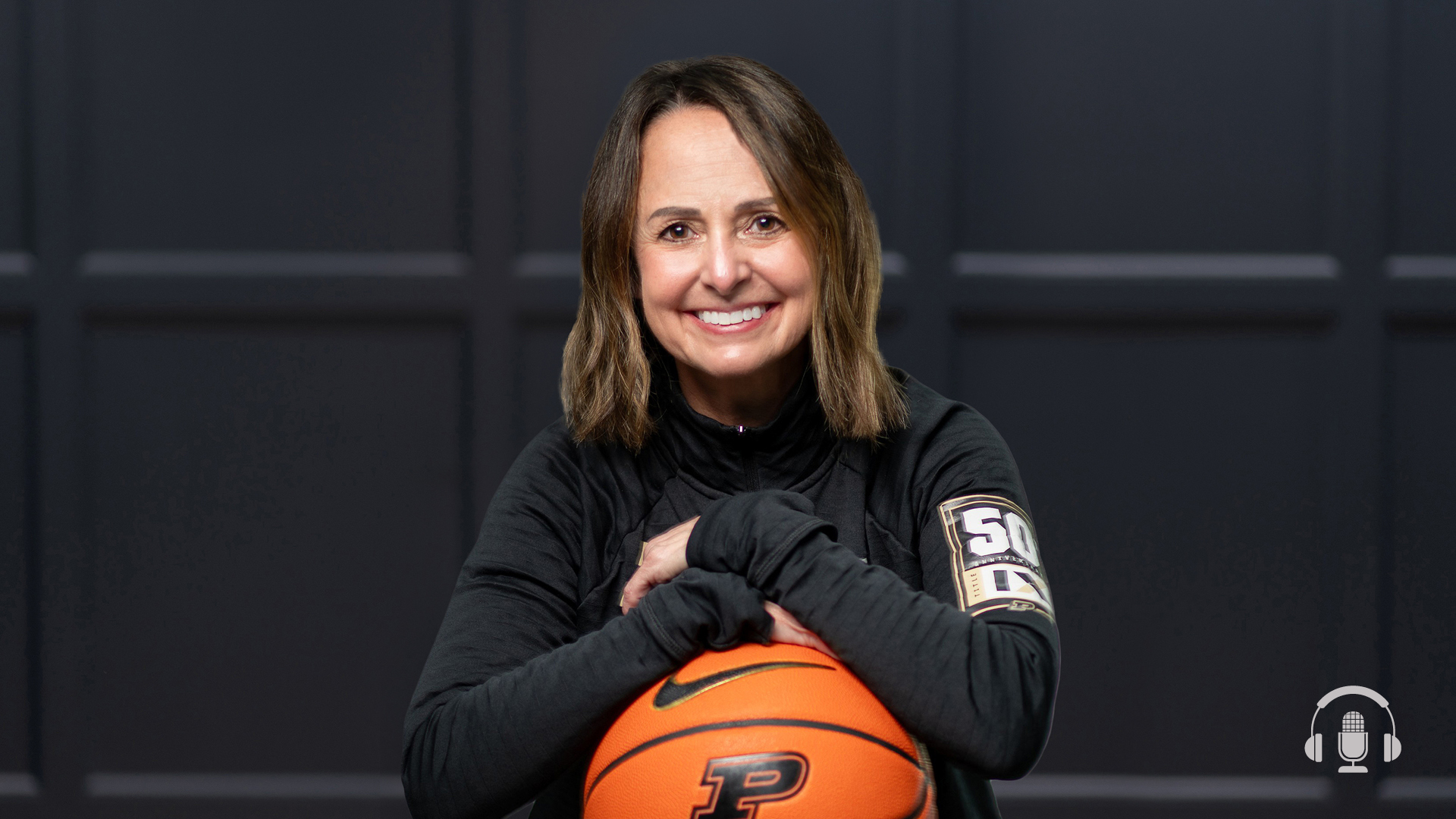Podcast Ep. 136: College Majors That Didn’t Exist 10 Years Ago: How To Stay Future-Ready
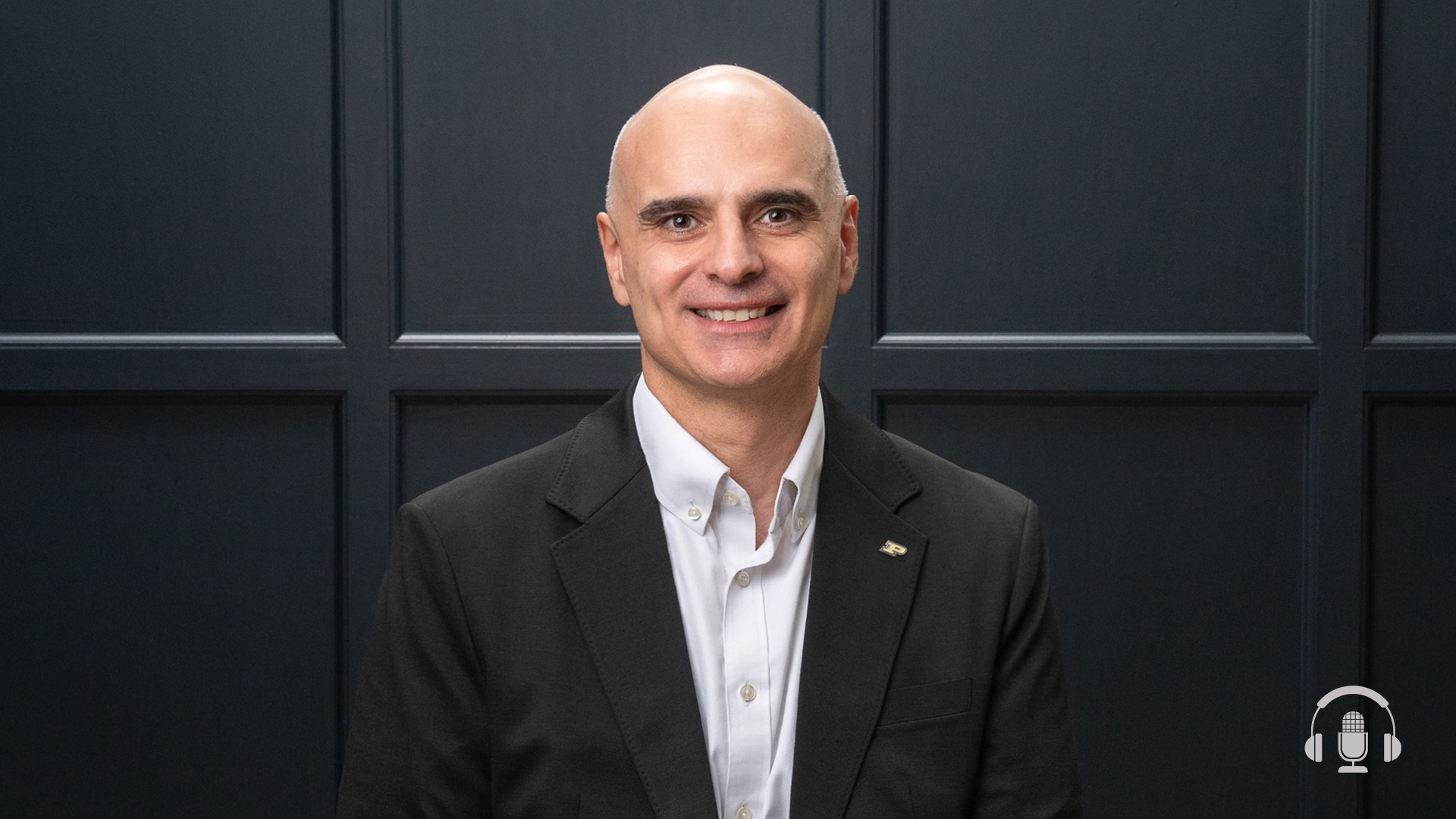
In this episode of “This Is Purdue,” we’re talking to Dimitri Peroulis, senior vice president for partnerships and online at Purdue and the Reilly Professor of Electrical and Computer Engineering.
As an executive leader, he guides the university’s online programs and the offices of Industry Partnerships, Global Partnerships and Engagement. He’s also an expert on Purdue’s innovative degrees and courses for workforce development and advancement that prepare students to stay “future-ready.” And he brings a wealth of technical knowledge and teaching experience to the ever-evolving higher ed landscape.
In this episode, you will:
- Hear about Purdue’s strategic relationships with corporate partners like Eli Lilly and Company and Wabash and how they’re enhancing student workforce preparation through research, internships and alumni mentorship.
- Discover what it means to be “future-ready” and what experiences students need to be flexible, resilient problem-solvers as they enter a changing workforce.
- Learn more about Purdue University Online’s new and expanded degree programs and microcredentials that didn’t exist 10 years ago, including the first and only ABET-accredited AI certifications and microelectronics and semiconductors certifications.
- Explore how these unique virtual programs and certificates are helping thousands of students balance their lives as full-time professionals and thrive in the classroom and industry experiences.
- Find out more about Dimitri’s journey growing up and studying in Greece to later winning Purdue’s Charles B. Murphy Outstanding Undergraduate Teaching Award.
You don’t want to miss this episode with an award-winning educator and thought leader who’s helping empower Purdue students with the skills they need to solve today’s toughest challenges.
- Watch the full video interview on YouTube
- Learn more about Dimitri Peroulis
- Learn more about Purdue University Online
- Learn more about Purdue University Online’s programs of study
- Learn more about Purdue’s Office of Industry Partnerships
- Learn more about Purdue’s Office of Global Partnerships
- Learn more about Purdue’s Office of Engagement
- Learn more about Purdue’s College of Engineering
- Learn more about the Elmore Family School of Electrical and Computer Engineering
- Learn more about the Charles B. Murphy Outstanding Undergraduate Teaching Award
Podcast Transcript
Dimitri Peroulis:
This is Dimitri Peroulis, and you’re listening to This is Purdue.
Kate Young:
Hi, I’m Kate Young, and you’re listening to This is Purdue, the official podcast for Purdue University. As a Purdue alum and Indiana-native, I know firsthand about the family of students and professors who are in it together, persistently pursuing and relentlessly rethinking. Who are the next game-changers, difference-makers, ceiling-breakers, innovators, who are these boilermakers? Join me as we feature students, faculty and alumni taking small steps towards their giant leaps and inspiring others to do the same.
Dimitri Peroulis:
Sometimes I compare my own experience as a student and the experience of the student now in the 21st century, in 2025 and beyond, and those students do need to be future-ready, they do need to understand how industry works, they do need to get hands-on learning experience, but they need to do that not as a one-off, but actually through a full integration.
Kate Young:
In this episode of This is Purdue, we’re talking to Dimitri Peroulis, senior vice president for partnerships and online at Purdue University. Dimitri recently kicked off his 23rd year at Purdue. He leads the university’s online programs and the Offices of Industry Partnerships, Global Partnerships and Engagement. He also serves as the Riley professor of electrical and computer engineering. As a leading expert on new innovative degrees and courses for workforce development and advancement, Dimitri is digging into the ever-evolving higher education landscape and how Purdue is effectively preparing students to stay future-ready. Plus, he’s sharing his advice for students entering today’s workforce. So let’s get to it. Here’s my conversation with Dimitri.
Dimitri, thank you for joining us on This is Purdue, the official Purdue podcast, so welcome to the show.
Dimitri Peroulis:
Thank you so much. It’s awesome to be here.
Kate Young:
You are an expert on new innovative degrees and different courses for workforce development and advancement, so we’re going to dive into all that today. We’re going to talk a lot about being future-ready and what that means. Let’s start by talking a little bit about your role. Tell us what you do at Purdue, and how the university is changing what college and experiential learning looks like.
Dimitri Peroulis:
Indeed, I’m wearing a couple of different hats. I’m an electrical engineer by training, so I’m a faculty member in the Elmore Family School of Electrical and Computer Engineering. I’m now serving as a senior vice president for partnerships and online. It’s interesting, partnerships include industry partnerships, it includes global programs and partnerships, and it includes the Office of Engagement, which is about our local city-level partnerships. And the online programs are mainly the programs that we offer through the main campus. We do have some online programs offered by regional campuses, but the majority are degrees and credentials here from West Lafayette.
Kate Young:
Dimitri explains how Purdue is changing what college and experiential learning looks like by partnering with leading corporations like Eli Lilly and Company and Wabash.
How are the university’s strategic relationships with these companies helping students stay future-ready?
Dimitri Peroulis:
That’s frankly what is on our mind when we’re thinking about these partnerships, and I think the key is to think of them as forging strategic-level partnerships that really will transform the experience of the student. Sometimes, I compare my own experience as a student and the experience of the student now in the 21st century, in 2025 and beyond, and those students do need to be future-ready, they do need to understand how industry works, they do need to get hands-on learning experience, but they need to do that not as a one-off, but actually through a full integration. And that’s frankly why we do these strategic partnerships, we try to integrate them fully in the curriculum of the student in terms of what they might learn in the classroom, but also what kind of research experiences they might have here on campus, what kind of internship experiences and co-ops might get, and global experiences. Some of the students like to do that and we really need to support them on this.
So many of these partnerships, you will see that they provide a whole hub of experiences. With Lilly, for example, we have center on campus that really takes students to the next level of engagement with Lilly. The students can understand how drug discovery works, how pharmaceutical manufacturing works, what does it mean to take something from the lab of a university, which sometimes it starts as a pure curiosity, but actually then leads to a full-fledged manufacturing process. And with Wabash as well, so they just need to learn how do supply and chain management skills work, how do these very complex companies carry operations so efficiently. So it’s all about this synergistic operation and this strategic alliance that we try to form between the university and the companies.
Kate Young:
It definitely feels like the days of getting an internship one summer, one semester, and that’s that, is over.
Dimitri Peroulis:
Yes, indeed.
Kate Young:
It’s all about that hands-on experiential learning, like you just talked about. How did these relationships with companies like Lilly and Wabash strengthen the overall workforce development and advancement, especially like you talked about with the drugs going from a lab out to the world to solve these challenges, talk a little bit about the research initiatives that are addressing the world’s toughest challenges today.
Dimitri Peroulis:
It’s interesting, when you think about the skills that the students will need when they join companies like the ones we’re talking about, of course, they will need what they learned in the classroom, but they will need a lot more. They will need a whole new mindset of how they apply problem-solving skills to solve some of these tough challenges. And those are young individuals that are going to join the workforce, and almost immediately, they’re going to be faced with the real world. And so, we try to make sure that while they’re still in the university and while they still have the time and the opportunity to learn those skills and to learn how to create this type of mindset, that they have all the time and the opportunity to do so.
That’s why I often tell students what you get at Purdue inside the classroom should not be more than 50% of your whole experience, the other 50% is outside, and industry partnerships is a big part of that. The fact that we’re able to offer this to our students, it’s incredible. We have more than 400 industry partners right now. Very, very few universities can really provide this kind of an experience to the student. And students can learn not only from the professors who sometimes lead those partnerships, but through the people who work in those companies. We have a lot of alumni in those companies. A lot of times, they develop mentorship relationships. So one step brings the other and it basically leads students to where we think they can be leaders very quickly.
Kate Young:
What advice do you have for students, maybe they’re interested in research, internships, engagement opportunities, how should they get their foot in the door?
Dimitri Peroulis:
Well, first of all, I would say don’t be shy.
Kate Young:
That’s hard though.
Dimitri Peroulis:
It’s hard, it’s hard. And we really try to make it as easy as possible by providing multiple pathways. For example, there are centers on campus, like the Undergraduate Research Center, that students can just go online or just go there and start getting the advice they need. We offer programs on campus, summer programs or programs… This semester, this fall, we have the Discovery Interdisciplinary Research Program. The students can participate and they can apply even if they have no connections on campus, even if they haven’t met anyone, even if they haven’t connected yet to maybe a research lab, they can immediately go ahead and do this. But I always advise students to also create their own network. They can connect, for example, with student clubs, there are hundreds of students clubs on campus, they can connect with research groups. Sometimes, knocking on somebody’s door, virtual or real, is a little bit intimidating, but that’s why we’re here. So thankfully, there are multiple pathways, and I always advise students to start with the most comfortable one, but slowly push their comfort zone to the next level.
Kate Young:
It gets easier and easier, right?
Dimitri Peroulis:
Indeed.
Kate Young:
Dimitri dives into Purdue’s flagship online programs, one of the intentional ways in which the university is adapting to an evolving workforce. He shares some of the most unique career-forward courses and degree programs available for today’s students.
Dimitri Peroulis:
In the online world, you will see students who are pursuing full degrees. We call that the credit-bearing credentials. Students who will pursue, for example, full master’s degrees online. And frankly, at Purdue now, we have full doctorate degrees online. You can get a Doctor of Technology, and as of last year, a Doctor of Engineering fully online, very, very unique opportunities. And those are the same degrees and the same credentials that people can earn here on our campus. They still earn a Purdue degree, they still get to walk through the Elliott Hall, they get taught by the same faculty members, they take the same exams, the same assessments, and of course, the same degree as everybody else. But in addition to that, we have the second bucket of offerings. Those are, I would say, career-focused micro-credentials, so people who need or want to be up-skilled very quickly in a field. An example is AI.
Kate Young:
Sure, hot topic.
Dimitri Peroulis:
Exactly. So we have people who graduated just a few years ago, they never took a single course in AI, and now they have to go and either work in the field of AI or even lead a group in AI. And some of those individuals need to work in the, I would say, hard tech of AI, but others need to think about applying AI to different spaces. What does it mean, for example, to apply AI into business? What does it mean to apply AI into governance or ethics or policy? So we created specific micro-credentials for that. We have actually 13 micro-credentials right now. They last about a month. Students can take them at their own pace. And then, right after that, if they want, they can continue and get even a full degree. But if they don’t want or don’t need a full degree, they’re going to be ready for industry.
Many of these credentials, by the way, are very unique in the sense… For example, the AI micro-credentials are the only ones and the first ones that have been ABET-accredited at Purdue here. Some micro-credentials are also stackable, you can stack one on top of the other and start building a degree pathway if you want to. Some of them are bringing topics together that you might not have thought about. For example, we have AI storytelling, so how do you bring AI and how do you build your skills to convey what you want to say in a very engaging way? And of course, depending on the field that you go, you can find exactly what you need.
Kate Young:
And these are degrees and coursework and certifications that didn’t exist, five, certainly not 10 years ago.
Dimitri Peroulis:
That’s right, that’s right. Some of them are brand new. We tend to build degrees that are really needed in the workforce now, but also in the future. And the number of students pursuing those degrees at Purdue is growing. Right now, we have almost 6,000 students who pursue full degrees at Purdue, fully online, and almost 14,000 who pursue micro-credentials. Those students benefit from the Purdue ecosystem, the infrastructure, our faculty, our staff members, the whole expertise, and from the industry connections we have to make those degrees relevant. For example, we work very closely with industry to co-build some of those micro-credentials in the areas, for example, of semiconductors. We work closely with industry, we have people from the industry working hand-in-hand with Purdue faculty members to bring a very unique offering, so people get to learn the fundamentals, but also what is applied right now.
Kate Young:
How do these things, AI-related degrees, we just talked about semiconductors, hypersonic certificates, how do these new online programs really help keep students future-ready?
Dimitri Peroulis:
Future-ready is a very interesting word. I know we talked a little bit about that. But when I think about a future-ready student, I think somebody who’s going to thrive and lead a very rapidly changing world. It’s a matter of giving them a very strong technical foundation in the areas, for example, that you mentioned, but it’s also a way of making them understand how they need to think about the future. Their mindset has to be a mindset of curiosity, of creativity, a mindset where they can take risks, a mindset that allows them to be adaptive and flexible. The world is not what it used to be 10 or 20 years ago, and likely the speed is going to accelerate for these students. So when we bring them through those unique offerings, of course, we will teach them what they need, but we try to create those communities that they will learn from each other and they will learn from the leaders, both in industry, as well as in academia.
Kate Young:
And when it comes to these online offerings and class formats, how does that differ from what Boilermakers get with the more traditional path?
Dimitri Peroulis:
For people who pursue degrees, we have the same faculty members and the same people who will teach them, but the flexibility is the key. So the typical online student is a student who is a working professional, they tend to manage full-time jobs, sometimes they tend to manage families, so they have limited amount of time, so they need to focus on what they need to do, and they have to basically do that very quickly and very efficiently. So we try to be really flexible on what we’re doing, and we try to support them in terms of what they need.
I’ll give you an example. A few years ago, and this is happening almost every year, I had a student who was a nuclear submarine officer. The student sent me an email at the very beginning of the semester saying, “Professor, I’m going to be literally underwater for three weeks, so I won’t be able to download lectures, I won’t be able to submit homework, I won’t be able to do projects.” And of course, we helped the student do the work as he needed. And it’s that flexibility, I think, that has put Purdue in a leadership position in the online courses, of course, in many other areas. But just to give you an example, many of our degrees are top ranked right now, many engineering degrees are top ranked, mechanical engineering is top ranked, electrical engineering is top ranked, engineering management, industrial engineering and so on. We really recognize, I think, in the way we do things and the kind of care, I think, we give to the students.
Kate Young:
How is Purdue, and specifically the online programs that we’re talking about, preparing students to leverage the degrees, the coursework, to excel after graduation?
Dimitri Peroulis:
First of all, we make sure that the students are truly taught by the very best. We’re very blessed to have here on campus the very best faculty, so they really learn from the very best. They really learn from people who don’t just teach the material, but the ones who are leading the future, and getting that experience, I think it’s invaluable. At the same time, they get those connections with industry folks. Many of the companies that I discussed before are also engaged in the teaching and learning for the students.
And of course, we help them afterwards. The students have the ability to come back to us every time they need something. This is not a static world. There are students who, yes, maybe right now, they’re studying AI, but perhaps sometime later, they need to study something more in the creative arts or something more in the business domain. So how does the business mindset blend with, let’s say, a science or engineering mindset? So we’re always there for them. When they come to our door, they can be absolutely certain that they get the best of the best, and in a way that they can actually learn, meet them where they are.
Kate Young:
And speaking of faculty, you still teach, you said-
Dimitri Peroulis:
I do.
Kate Young:
… this will be your 23rd year at Purdue.
Dimitri Peroulis:
I do, I do.
Kate Young:
Amazing. Congrats.
Dimitri Peroulis:
I’m teaching every semester, yes, thank you.
Kate Young:
Let’s dive into your Purdue journey. How did you come to Purdue? What’s your background?
Dimitri Peroulis:
After I finished my PhD, I was looking for a university that could truly help me apply my knowledge, but at the same time, teach students. So I was looking for this, let me call it, perfect balance between research excellence and teaching excellence, and Purdue’s values were really well-aligned with what I was looking for. At the same time, Purdue had the facilities that I needed. I’m doing experimental work in the area of electronics and semiconductors. The Burke Nanotechnology Center was just coming up at the time I joined Purdue, so this was a big magnet, I think, for me, as well as many other folks. And I still remember how welcoming the community was here. It was incredible to start talking about collaboration options, growth opportunities, from my very, very first week here, and that spirit still remains. So there was no question really.
Kate Young:
And you won the Charles B. Murphy Outstanding Undergraduate Teaching Award in 2010, which is Purdue’s highest undergraduate teaching honor. How do you think your passion for teaching and your professional background helps you in your current role today?
Dimitri Peroulis:
I have been thinking a little bit about that over time, because I’m still teaching, but I’m still serving the university in different roles, and a lot of times, I think the skills in teaching and the skills in leadership overlap. For example, in teaching, I think a good teacher is all about connecting with the students, is all about curiosity, compassion a lot of times, and at the end of the day, what are you trying to do? You’re trying to truly empower a student to take the next step that normally they couldn’t take before you met them. But now, they feel not only they can take it, but they actually can take it with confidence, so they feel really empowered.
In many ways, leadership positions require similar skills. And so, when I work with my colleagues, when I’m thinking about their problems, when I’m thinking about the next step we have to take as a university, a lot of these thoughts come back and I think a lot of these skills help me move forward. And of course, I’m an engineer by training, I have to bring my engineering and problem-solving mindset into this. So I think it all blends in a creative way.
Kate Young:
Absolutely, that’s special. So you grew up in Greece and studied there, we had Assistant Professor Alex Psomas was also a fellow Greece resident.
Dimitri Peroulis:
Oh, yeah.
Kate Young:
And then, you were a graduate student at the University of Michigan. What did the workforce look like then?
Dimitri Peroulis:
Boy, I’ll try to remember, it’s been a while. But I do remember that when I was an undergraduate student back in Greece and I was studying engineering, it was a different world. The emphasis was a lot more on building analytical skills, it was also a lot more building a theoretical foundation, less about hands-on learning. And at the time, I think all I was thinking about, and most of my colleagues, were excelling academically and looking for some type of, I would say, stable next step. And again, I think we were in an academic environment that was more or less stable for decades. I’m not sure we can say that at this point.
But in my graduate studies, things changed a little bit. I think everybody who goes to grad school find themselves in this dynamic environment which is very much innovation-driven. I actually chose to do a hands-on PhD, a lot of hours in the lab, a lot of hours trying things, even though I had almost no background in this, mostly because I wanted to push myself to learn that part of the world. And now, we come to university that gives opportunities to the students, thankfully much more than I experienced, much more than just the analytical skills, just the technical skills, forcing the students to think about business, forcing the students to think about entrepreneurship, allowing them to connect with the industry, allowing them to think a bit more broadly about the world. So thankfully, I think we are now providing more opportunities than in the past.
Kate Young:
Reflecting back and knowing everything that you know now, if you were a student at Purdue today, what career path do you think that you would take?
Dimitri Peroulis:
Oh, sometimes I think I wish I could become a student again, because we’re all learning, we talked about lifelong learning before, so I’m trying to do this in many opportunities as much as I can. But if I was back at Purdue, I think, as a student, perhaps I would think about three different dimensions. So one would be, I would say, excellence in technology. I’m an engineer, so I have to think about that, I’m sure it’s not for everyone. But think about depth in the particular field you want to focus on. But then, I would also think about creative expressions. I think this is so crucial in today’s world. We talk a lot about AI, we talk a lot about technology, but what about poetry and what about music and what about what makes all of us humans? I think this kind of creative expression will be more and more crucial in the future. And the last thing I would say is about thinking about the global business impact. So as I’m thinking about what domain I would focus on, I would try to make sure it’s business-relevant, and ideally in a global perspective.
Kate Young:
What advice do you have for students entering the workforce today? What are some practical steps that they can use to stay adaptable, resilient, persistent, what advice do you have?
Dimitri Peroulis:
Well, I think you already mentioned some very key-
Kate Young:
Key words.
Dimitri Peroulis:
… key words. I would start with resilient. The world is changing, setbacks are almost unavoidable, challenges, frustrations, are difficult not to face. So resilience is a key, I think, skill and mindset that people need to bring. But also, the workforce provides opportunities. So I would think of a student who is applying both, I would say, an offensive approach, in the sense of grabbing opportunities, being out there, hungry to learn, hungry to contribute, eager to move the world forward in the right direction, and at the same time, being able to cope with difficulties that will come almost for sure, so not being discouraged, not giving up. The world is moving fast, is adaptive, but it also provides lots of opportunities. So that mindset, I think, is crucial.
Kate Young:
Well, Dimitri, it was a pleasure. Thank you for joining us today. Is there anything else that you’d like to tell our listeners or our viewers?
Dimitri Peroulis:
Well, as you can probably imagine, I’m quite excited about being at Purdue. Maybe one thing I will add is that no matter if you are a student or if you’re an industry partner or if you’re a global partner or if you’re a researcher or a faculty member, I think people find that Purdue is where innovation actually meets impact, and that’s what really is exciting so much. And that’s what I think all of our partners, no matter which direction come to us and no matter what opportunities they explore with us, at the end of the day, they think about people and impact. So thank you.
Kate Young:
Yes, absolutely, thank you so much.
Dimitri exemplifies the Boilermaker spirit and humility, and we can’t thank him enough for joining us. If you’re interested in learning more about Purdue online, you can visit purdue.edu/online. Dimitri also shared some bonus content with us, including his top two majors of the future on our podcast YouTube channel, youtube.com/@thisispurdue, and don’t forget to hit that subscribe button while you’re there. Plus, be sure to follow This is Purdue on Apple Podcasts, Spotify, iHeartRadio or wherever you get your podcasts. We have a very special series coming out in October, and trust us, you will not want to miss it. More to come on that very soon.
This is Purdue is hosted and written by me, Kate Young. Our podcast videography for this episode was led by Thad Boone, in collaboration with Jon Garcia, Zach Mogensen and Alli Chaney. Our social media marketing is led by Maria Welch. Our podcast distribution strategy is led by Carly Eastman. Our podcast design is led by Cheryl Glotzbach. Our podcast photography is led by John Underwood. Our podcast team project manager is Rain Gu. Our podcast YouTube promotions is managed by Megan Hoskins. Additional writing and research assistance is led by Sophie Ritz and Ashvini Malshe. And our creative production assistant is Dalani Young. Thanks for listening to This is Purdue. For more information on this episode, visit our website at purdue.edu/podcast. From there, you can head over to your favorite podcast app to subscribe. And don’t forget, you can also check out all of our podcast content on our podcast YouTube page, youtube.com/@thisispurdue. And as always, Boiler Up.
